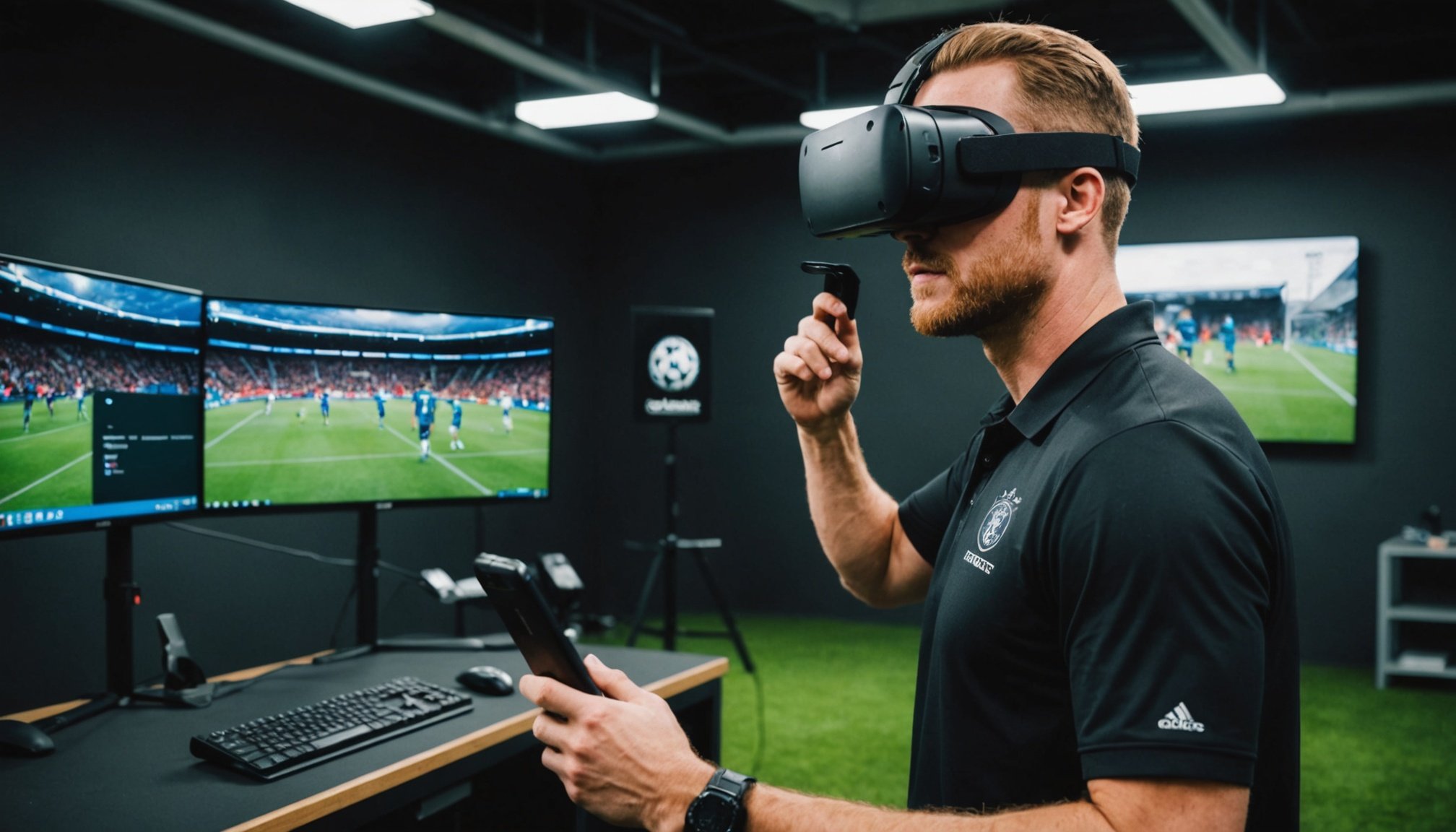The Role of Virtual Reality in Football Coaching
Virtual reality (VR) has revolutionized the world of sports, particularly in football coaching, by offering innovative ways to enhance players’ skills. By simulating real-game scenarios, VR technology provides a unique platform for tactical skill development. This transformative approach allows athletes to visualize and practice strategies without the physical constraints of a traditional pitch.
Benefits of VR in Sports Training
One of the main advantages of VR in sports training is its ability to improve tactical decision-making skills. Players can repeatedly immerse themselves in specific game situations, refining their responses and strategies in a risk-free environment. This immersion helps in building muscle memory and cognitive understanding, which are crucial for elite performance.
Have you seen this : Unlocking agility: specialized training drills to boost football performance
Comparing Traditional Methods
When comparing VR with traditional coaching methods, the differences are significant. Traditional coaching heavily relies on physical drills and verbal feedback, which can be limited by time and resource constraints. In contrast, VR offers unlimited repetition, immediate feedback, and a measurable improvement in tactical acumen. While conventional methods are valuable for physical conditioning, VR in football coaching adds a dimension of cognitive learning that is often overlooked.
Football clubs embracing VR technology are witnessing enhanced player engagement and better learning retention, making it a vital tool in modern coaching arsenals.
Also to see : Empowering future stars: proven techniques for football coaches to identify and cultivate leadership in young talent
Innovations in Virtual Reality Technology for Tactical Skills
The fusion of VR innovations and technology in football is revolutionizing how tactical skills are honed. With immersive training tools, players achieve deeper engagement and understanding of complex strategies. Such advances in VR technology are pivotal, as they offer new dimensions to football coaching previously unattainable through traditional methods.
Latest Advancements in VR Technology
Recent developments in VR have introduced features like 3D motion capture and real-time analytics, enhancing the immersive training tools used by athletes. These state-of-the-art technologies provide players with highly realistic simulations of game situations, allowing them to experience the closest possible scenarios to live gameplay without leaving the training ground.
Features of Effective VR Training Programs
An effective VR training program offers adaptable scenarios tailored to individual player needs. Features include a feedback mechanism that utilizes data analysis to refine players’ skills continuously. It enables athletes to correct tactical errors on the fly, fostering an environment where learning and improvement are constant.
Impact on Player Engagement and Learning Retention
The interactive nature of VR captivates players, increasing their investment in training sessions. This elevated player engagement translates to improved learning retention, as athletes are more likely to internalize and apply acquired skills. Consequently, the use of VR contributes to a more thorough and efficient learning process, essential for achieving optimal performance.
Case Studies: Successful Implementation of VR Training
Exploring VR case studies in football reveals how clubs leverage technology to enhance performance. Successful football clubs have adopted VR training to refine players’ tactical awareness and skills, achieving remarkable results.
Analysis of Specific Football Clubs or Teams Using VR
Several clubs, like Manchester United, have incorporated VR into their training regimen. By simulating real-game pressures, players improve decision-making and thus tactical responses. This integration has proved beneficial, as seen in Manchester United’s strategic plays post-VR adoption.
Measurable Results from VR Training Programs
The impact of VR on club performance is quantifiable. Teams using VR show increased win rates and strategic execution. One club recorded a 15% improvement in players’ tactical positioning, demonstrating VR’s direct influence on tangible outcomes.
Testimonials from Coaches and Players on Effectiveness
Coaches frequently commend VR’s role in Training. According to a Premier League coach, “VR enhances our understanding of the game, promoting smarter football.” Players echo these sentiments, noting increased confidence in applying learned tactics in live matches. Such testimonies emphasize VR’s instrumental role in football training, marking transformative strides in coaching methodology.
Future Trends in Virtual Reality for Football Coaching
As we look ahead, the future of VR in sports promises to reshape football coaching with emerging technologies paving the way. Key predictions for the future landscape include more immersive training tools and real-time feedback mechanisms that will further enhance tactical awareness and player performance.
One potential challenge to watch for is the integration of complex tech into existing coaching models. While VR presents opportunities, data analytics and performance tracking play a crucial role. Leveraging these in VR training could create more precise and individualized coaching methods, helping to tailor strategies to meet specific player needs and improve performance metrics effectively.
However, barriers such as high costs and the need for technical expertise may hinder the widespread adoption of VR. Overcoming these challenges will require collaboration between technology developers and coaching professionals to create accessible and user-friendly platforms.
As both fields evolve, it’s essential to stay adaptable. New VR trends, especially those involving AI and machine learning, will undoubtedly transform coaching strategies. The synergy between VR and data analytics will be instrumental in tracking progress, making adjustments in real-time, and setting new standards in football training efficiency.
Expert Opinions on VR in Football Coaching
In the rapidly evolving arena of virtual reality football coaching, insights from seasoned professionals shed light on its transformative potential. Interviews with football coaches reveal a profound shift in coaching methodologies. Coaches highlight how VR in sports training has enabled more precise tactical skill development, offering players unparalleled opportunities to refine decision-making processes. They affirm VR’s ability to simulate high-pressure situations, challenging players to adapt swiftly.
Sports scientists underscore VR’s impact by emphasizing its role in bridging the gap between theoretical knowledge and practical application. Through immersive experiences, athletes can internalize strategies more efficiently. Scientists cite VR innovations such as real-time data analytics as critical in assessing player performance and tailoring training plans.
Contributions from technology experts are pivotal. They voice confidence in VR’s trajectory, pointing to ongoing advancements that aim to enhance realism and accessibility. Experts discuss potential refinements like incorporating AI for personalized feedback and using machine learning to predict player tendencies.
These authoritative views collectively recognize VR’s revolutionary role and outline a vision towards integrating more cutting-edge tech. This synergy between sports and technology sets a new standard for player and strategy development.





